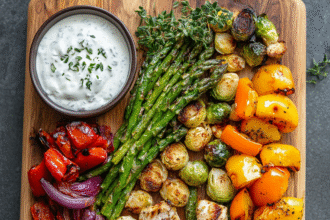Probiotics vs. Prebiotics: Know the Difference—and What I Eat for Gut Health
When I began exploring the connection between food and gut health in a more focused manner, I kept seeing the terms “probiotics” and “prebiotics” pop up in research, courses, and nutrition literature. I already knew that both played a role in digestive wellness, but I wanted to understand the how and why behind it.
Everything became clear once I understood each one’s function inside the gut. Building gut-friendly habits becomes sustainable and straightforward when you know what these nutrients do for your gut microbiome.
Probiotics: The Friendly Gut Residents
Probiotics are live bacteria that help populate your gut with beneficial microbes. These “good bugs” support digestion, nutrient absorption, immune function, and mood regulation.
In my routine, probiotics show up in the most natural, delicious ways. My go-to probiotic-rich foods include:
- Greek Yogurt — Creamy, protein-packed, and full of live cultures. I enjoy it daily with fruits like mango or berries and some honey.
- Fermented and Pickled Vegetables — Think sauerkraut, kimchi, and naturally brined pickles. My mom makes amazing mango pickles. I often add a forkful of pickles to my meals that are rich in beans and protein.
Prebiotics: The Fuel Your Gut Bugs Need
If probiotics are the healthy residents of your gut, prebiotics are the foods that keep them alive and thriving. These are special fibers and plant compounds that our bodies can’t digest, but our gut bacteria can.
Here are some of the prebiotic-rich (and digestion-friendly) foods I rely on regularly:
- Garlic and Onions — I include them in nearly every savory meal.
- Asparagus and Leeks — Roasted, sautéed, or blended into soups.
- Bananas — Especially slightly green ones, perfect in smoothies.
- Oats and Apples — Two fiber-rich staples I reach for often.
- Brussels Sprouts — A quiet prebiotic powerhouse.
- Kiwi, Berries, and Mango — Loaded with fiber, enzymes, and antioxidants.
- Beans and Lentils — High in protein and fiber, essential in my meals.
Why You Need Both: A Balanced Gut Equation
Probiotics are like planting seeds. Prebiotics are the sunlight and water that help those seeds grow.
When you consistently eat both, you create the right environment for your gut to:
- Improve digestion and regularity
- Support immunity and inflammation response
- Enhance mood and focus via the gut-brain connection
- Boost nutrient absorption and overall metabolic health
How I Keep Gut Health Simple
Supporting your microbiome doesn’t require expensive supplements or strict routines. My approach is rooted in consistency and ease:
- Greek yogurt with mangoes, bananas, or berries
- Cooking with garlic, onions, and leeks
- Roasted Brussels sprouts and asparagus alongside dinner
- A spoonful of pickled vegetables with meals
- Fresh mango or kiwi as a sweet snack
Understanding the Difference and Building a Strong Gut
Probiotics bring the good bacteria in. Prebiotics keep them thriving. Together, they form the foundation of a balanced, resilient gut—and when your gut is healthy, everything else works better, too.
Whether you’re just starting your gut health journey or ready to fine-tune it, understanding these two nutrients can bring real, lasting results.






